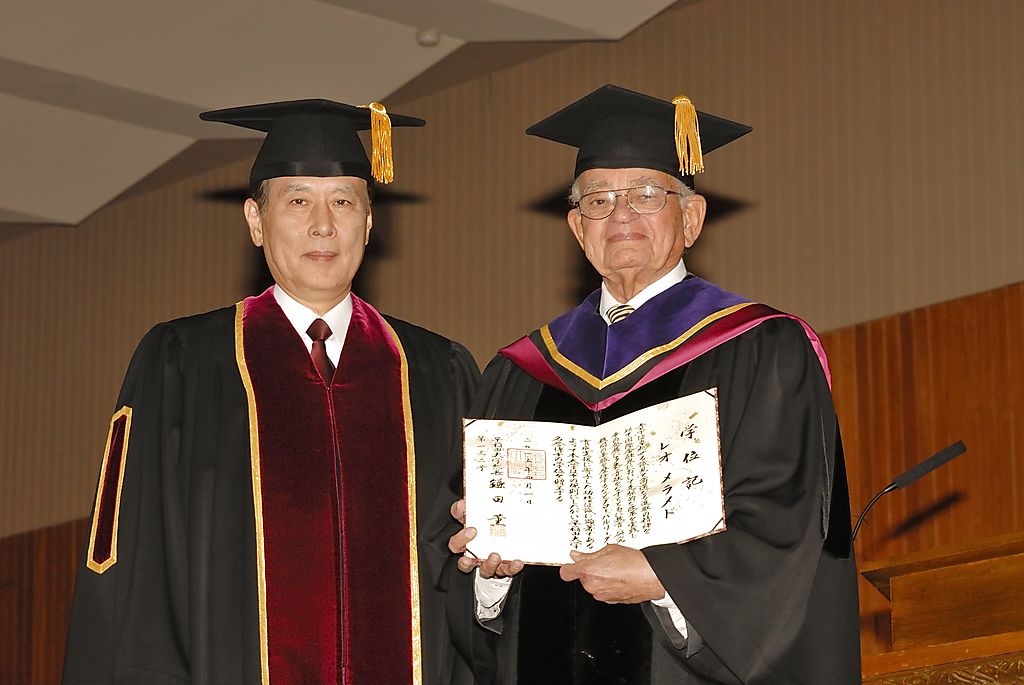Honoring Leo Melamed
Mon, Apr 13, 2015-
Tags
Leo Melamed was born in Bialystok, eastern Poland, in 1932, the only child of two schoolteachers. At the age of seven, as Nazis occupiers entered his hometown, he and his parents fled the certainty of persecution in Poland for the uncertainties of neighboring Lithuania. There, the Japanese vice consul Chiune Sugihara, defying his own government’s instructions, issued to the Melamed family, as to thousands of other Jewish refugees, life-saving “transit visas” from Lithuania to Japan. Enduring the intense cold and deprivations of a slow train ride through Siberia, the family arrived at Vladivostok and crossed over to the Port of Tsuruga in Japan. Only there, Melamed has written, did his mother let loose of his hand. They had survived the Holocaust.
After a four-month stay in Japan, Melamed and his parents took passage to the United States, and in 1941 settled in Chicago. In 1950 he entered the University of Illinois on its campus in Chicago, and continued his education by entering The John Marshall Law School. To help finance his education, took a part-time position on the floor of the Chicago Mercantile Exchange, immersed in the chaotic world of pork-belly futures trading. The experience transfixed him. After graduating from the law school, he worked briefly as an attorney, then returned to the Merc as a full-time futures trader. In 1967 he was named to the board of the Exchange and only two years later, at the ripe age of 36, assumed the office of chairman.
With fertile creativity, Melamed set about making changes, reforming the Exchange and making its work open and transparent. Yet more significant were changes he brought to the work itself. If the futures of agricultural and livestock could be traded, he reasoned, why not financial products? So it was that Melamed created currency futures and similar commodities and brought them to a market that had previously been restricted to farm products. The result was the IMM, the International Monetary Market, the world’s first market in financial futures. Other innovations followed and in time came “Globex,” the world’s first futures electronic trading system. With these and other innovations, each of global reach and significance, Melamed earned the praise of his colleagues as the “Father of Financial Futures Markets.” Today the Chicago Mercantile Exchange—reformed, revitalized and renamed the CME—is the largest futures and options exchange in the world, its trading floor as sleek and quiet as it was once rowdy and hot.
Melamed led the Merc for 35 remarkably productive years, and now serves as Chairman Emeritus of the Exchange and Chairman of its Strategic Steering Committee. He is also Technical Adviser to the U.S. Commodity Futures Trading Commission (CFTC), and special adviser on futures markets to governments worldwide, including that of China, where he assists the International Advisory Council (IAC) of the China Securities Regulatory Commission (CSRC). For his eminent contributions to the international financial community Melamed is the recipient of numerous awards, including the William F. Sharpe Lifetime Achievement Award.
Mr. Melamed’s enthusiasm for global development extends beyond finance to education, particularly higher education, whose importance he advocates at every turn. Among his many involvements with higher education, he serves on the Board of Overseers of the Becker Friedman Institute for Research in Economics at the University of Chicago, and on the board of LEAPinnovations, an educational technology firm. He is also on the board of the Scholar Rescue Fund of the Institute of International Education (IIE), the world’s largest global higher education promotion organization based in the United States, in which Waseda itself participates.
Throughout his demanding career Leo Melamed never forgot Chiune Sugihara, who had studied at Waseda University’s Advanced Teacher’s College, paying frequent respect to him for his courage and humane conduct. In 2014, he traveled to Japan to visit sites of importance to Sugihara, including the Waseda campus, where he placed flowers at the Sugihara memorial. At a meeting that day with students, he issued a passionate challenge: “Even one person,” he said, “can change the world. You are lucky to be at the university that produced Chiune Sugihara, who stood up for what was right. Take advantage of this opportunity and walk the path of righteousness with your own views so that, at life’s critical junctures, you too can make good decisions.” Leo, of course, had himself done just that, turning adversity and near disaster into a lifelong pursuit of economic innovation and global good.
So it is that in 2015, seventy years after the end of the Holocaust, Waseda University finds it meaningful and appropriate that we unite in a new way the courageous work of Chiune Sugihara, who persisted in his personal beliefs in the service of our common humanity, with the bold work of Leo Melamed, who used the new life that was given him to master, then profoundly transform, the world’s financial community. It is high time for Waseda University, Sugihara’s alma mater and the cradle of global leaders everywhere, to welcome Leo Melamed as its Honorary Doctor.
Accordingly, the President, Executive Board, Board of Trustees, and Faculty of Waseda University are unanimous in conferring upon
LEO MELAMED
the degree of Doctor of Laws, honoris causa.
Vivat universitas scientiarum! Laudate quem universitas honorabit!
April 1, 2015
Waseda University














